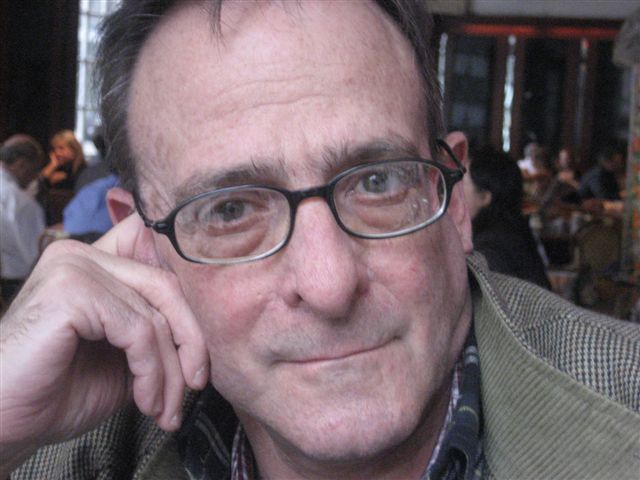Ted Greenwald
photo: Ch.Bernstein/2007
Greenwald on PennSound
Almost 20 years ago, Ted interviewed
me for a series he was
running in the Poetry Project Newsletter
INTERVIEW: CHARLES BERNSTEIN
by Ted Greenwald
originally published in the Poetry Project Newsletter, April/
May 1988
INTERVIEW: CHARLES BERNSTEIN
by Ted Greenwald
TG:
What does it feel like to be a poet in the “postmodern” era?
CB:
[laughs]
What does it feel like to be anybody in the postmodern
era? Is one anybody in the postmodern era? As far as poetry
goes, for most people modernism never arrived, so postmodernism
seems premature.
Does language have a future?
Language only has a future. And we can find it only in the present.
It’s too bad many people find the present in language something
that makes no sense to them, because if we can’t make sense
of / with the present then prospects for the future are none
too good. And our ability to understand and respond to the past
is numbed, if not obliterated.
What about the future of words?
What about the future of words! In a sense there are no
words, only languages. And languages have no meaning outside
their use. So the future of words and languages is dependent
on our doing something with them rather than their doing something
with us. We are given the words that we use, but we don’t
have to pronounce them the way we’ve been taught, or order
them as we have been ordered.
Can poetry develop an economy?
Poetry is always involved with economy at many different levels.
The question really is, can poetry evade economy, as Romantic
ideology seems to suggest. At one level there’s the semantic
economy of poetry: accumulation and loss, absorption and repellence,
excess and limitation. At another level, there’s the economy
of distribution and dissemination: production, context of publication,
readings, distribution, response. This second level of poetic
economy contributes to the meanings of a poem as much as the
first.
What does love got to do with it?
They don’t know what love is. I know what love is.
You do?
Love is only doing. And acts of love are not the same
as talking about them.
What’s your sense of the direction poetry’s taking
as we move into the 21 st century?
I think that there’s a greater understanding that poetry
even within a single language like English cannot be understood
as a unitary practice. The differences among poetries are incommensurable.
And this radical decentralization of expression opens up the
potential for communication of a different sort than we’ve
grown accustomed to. You might call this a revolution in democracy.
At the same time, one can expect enormous resistance to these
developments.
Are you suggesting that art is democratic?
The kind of democracy I’m talking about is not the majority
dictating to and restricting the licenses of the minority, but
rather a democracy in which the rights of minorities and the
particular individuation of their perspectives are not only protected
but fostered. The “English First” movement is perhaps
the most visible symbol of opposition to the sort of radical
democracy I am talking about.
Sort of like endangered species?
Our species is endangered. Not only by physical annihilation
but also mental annihilation, which means greater and greater
uniformity of thought, expression, and conduct. And uniformity
is engendered not limited by the sorts of “either/or” choices
which are a product of our consumer society.
What’s your favorite movie of the 80s?
Everybody’s already answered that question.
Does poetry require inspiration to be produced?
Yes.
How important is boredom to “modernism”?
I think that boredom is often a way of pointing to the inexplicable
and the unknown as much as the mundane. The value of putting
forward boredom as a positive feature of a work seems strained
at this point, but readers will often find it difficult to involve
themselves in that which is totally enthralling. If paradise
were put on the market there wouldn’t necessarily be that
many buyers.
What’s your favorite weather?
I don’t have a favorite weather. And for that reason I
don’t like it to stay the same too long. This is also an
answer to your last question.
Who gets the horse?
Not the horse trader. And not the rider. Maybe nobody should
get the horse. Maybe the horse can just go home.
Who does the dishes?
We alternate.
Who gets the girl?
Not the girl trader. And not the rider. Maybe she can go home
too. Maybe.
But you can’t go home again?
You could if you found the address.
Any advice to young poets?
Look for the address.
published in the Poetry Project Newsletter, April/ May 1988
link | 03-19-07
